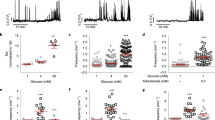Abstract
INSULIN is produced and secreted by the B cells in the endocrine pancreas. In vivo, insulin secretion is under the control of a number of metabolic, neural and hormonal substances. It is now clear that stimulation of insulin release by fuel secretagogues, such as glucose, involves the closure of K+channels that are sensitive to the intracellular ATP concentration (KATP channels)1. This leads to membrane depolarization and the generation of Ca2+-dependent action potentials2. The mechanisms whereby hormones and neurotransmitters such as adrenaline, galanin and somatostatin, which are released by intraislet nerve endings and the pancreatic D cells, produce inhibition of insulin secretion are not clear3. Here we show that adrenaline suppresses B-cell electrical activity (and thus insulin secretion) by a G protein-dependent mechanism, which culminates in the activation of a sulphonylurea-insensitive low-conductance K+channel distinct from the KATP channel.
This is a preview of subscription content, access via your institution
Access options
Subscribe to this journal
Receive 51 print issues and online access
$199.00 per year
only $3.90 per issue
Buy this article
- Purchase on Springer Link
- Instant access to full article PDF
Prices may be subject to local taxes which are calculated during checkout
Similar content being viewed by others
References
Ashcroft, F. M. A. Rev. Neurosci. 11, 97–118 (1988).
Henquin, J. C. & Meissner, H. P. Experientia 40, 1043–1052 (1984).
Ashcroft, F. M. & Rorsman, P. Biochem. Soc. Trans. 18, 109–111 (1990).
Arkhammar, P. Nilsson, T., Rorsman, P. & Berggren, P.-O. J. biol. Chem. 262, 5448–5454 (1987).
Horn, D. R. & Marty, A. J. gen. Physiol. 92, 145–159 (1988).
Smith, P. A., Ashcroft, F. M. & Rorsman, P. FEBS Lett. 261, 187–190 (1990).
Trube, G., Rorsman, P. & Ohno-Shosaku, T. Pflügers Arch. 407, 493–499 (1986).
Schmid-Antomarchi, H., de Weille, J. R., Fosset, M. & Lazdunski, M. J. biol. Chem. 262, 15840–15844 (1987).
Dunne, M. J., Bullet, M.-J. Li, G., Wollheim, C. B. & Petersen, O. H. EMBO J. 8, 413–420 (1989).
deWeille, J., Schmid-Antomarchi, H., Fosset, M. & Lazdunski, M. Proc. natn. Acad. Sci. U.S.A. 85, 1312–1316 (1988).
Bokvist, K., Rorsman, P. & Smith, P. A. J. Physiol., Lond. 423, 327–342 (1990).
Hille, B. Ionic Channels of Excitable Membrane 211–216 (Sinauer, Sunderland, 1984).
Nilsson, T., Arkhammar, P., Rorsman, P. & Berggren, P.-O. J. biol. Chem. 263, 1855–1860 (1988).
Author information
Authors and Affiliations
Rights and permissions
About this article
Cite this article
Rorsman, P., Bokvist, K., Ämmälä, C. et al. Activation by adrenaline of a low-conductance G protein-dependent K+ channel in mouse pancreatic B cells. Nature 349, 77–79 (1991). https://doi.org/10.1038/349077a0
Received:
Accepted:
Issue Date:
DOI: https://doi.org/10.1038/349077a0
This article is cited by
-
A critical role of the mechanosensor PIEZO1 in glucose-induced insulin secretion in pancreatic β-cells
Nature Communications (2022)
-
Gi/o protein-coupled receptor inhibition of beta-cell electrical excitability and insulin secretion depends on Na+/K+ ATPase activation
Nature Communications (2022)
-
GRK2 contributes to glucose mediated calcium responses and insulin secretion in pancreatic islet cells
Scientific Reports (2021)
-
Regulated expression and function of the GABAB receptor in human pancreatic beta cell line and islets
Scientific Reports (2020)
-
Slow potentials encode intercellular coupling and insulin demand in pancreatic beta cells
Diabetologia (2015)
Comments
By submitting a comment you agree to abide by our Terms and Community Guidelines. If you find something abusive or that does not comply with our terms or guidelines please flag it as inappropriate.



